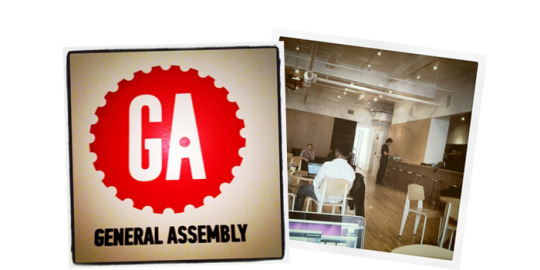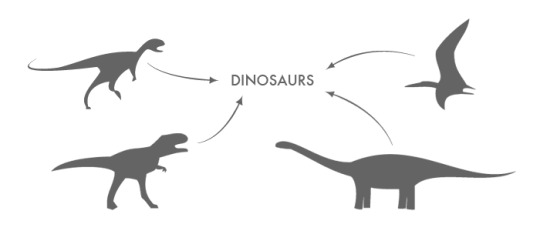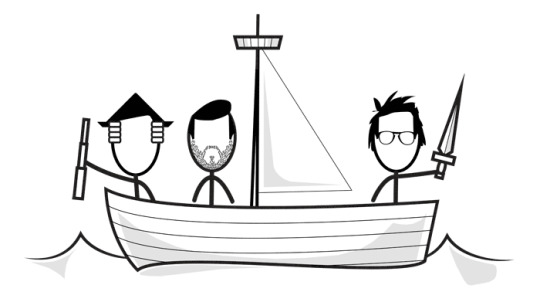Photo

We’re No Longer Rolling Stones
No, not the musicians. Obviously. We’re not English and Dave can’t - nor has he ever - wailed on an axe. It’s just that we’ve been nomadic, working from coffee shops, cafes, hotel lobbies, and when desperate, our apartment, for a while now. It’s been a nice lifestyle (chatting up baristas and flirting with fellow patrons while we haxxor and design and scheme), and yet with the change of the seasons and the progression of Tapl.io has come the yearning to set off into the wild blue yonder (aka.- shared work spaces). After touring a few of the great spaces available here in NYC, we’ve chosen to set up shop at General Assemb.ly, located in the heart of the flatiron district. We’re incredibly excited about joining GA’s notoriously creative community, and we’re looking forward to the many soirees we’re sure to attend and the friends we’ll (hopefully) make!
2 notes
·
View notes
Photo

A BETTER 'SEARCHFLOW'
As the web has developed and we’ve become accustomed to the many product and service offerings, a pattern has emerged; when searching for specific types of information we tend to only depend on a few sources. We don’t care about the tens of millions of pages that a search engine returns. Often, we don’t even care about the pages that the search engine determines most relevant. The pages that we do care about are typically from the sites that we are familiar with and that we trust most. Just as it is in the real world, we pick favorites.
When a user conducts a search, they follow a process that we at Tapl.io like to call a “searchflow”. A searchflow is a user’s unique path of least resistance to becoming informed. Most of the time a user’s searchflow follows a very consistent path within categories of search topics. For example, when looking for information about a restaurant, a user tends to visit the same combination of sites, often in a very specific order.
A user’s searchflow is naturally finite because of the costs (work) associated with gathering relevant content from disparate, silo-ed sites. During any given search, a user may only see a fraction of the high quality information available for consumption because at some point the marginal value of that additional content is outweighed by the costs associated with obtaining it (*Flashback to high school econ: Law of Diminishing Returns).
The problem with such a finite searchflow is that our opportunity to become truly informed and to experience ‘information discovery’ is constrained by the sites that we regularly use. We’re not seeing the entire picture because the cost of obtaining it is too high. As a result we’re subjected to the biases present in the limited number of content sources that we do regularly use, and we’re often unaware of what we’re missing out on. If only ignorance truly was bliss!
To some extent, one could argue that there is actually a negative relationship between searching and discovery; but it doesn’t have to be that way. What happens if we significantly reduce the personal investment associated with checking sites for relevant, desirable information? I believe that if done properly, users are afforded the ability to greatly increase the breadth of their searchflow while reducing the overall cost (work) involved. I also believe that allowing users to efficiently consume content from a wider range of sources is an integral part of nurturing discovery. In the case of finding a great restaurant, not only could we find one that would have otherwise gone unfound, but we could also find new and interesting information about restaurants that we already know and love (Deals anyone?). It’s not just about eliminating or reducing noise, it’s about completely redefining what it means to ‘search’.
I’m not convinced that the key to this lies in a new algorithm or technological advancement. Rather, I think the solution is in changing how people interface with content on the web. The barriers that currently silo content must be brought down and searchflows must be optimized. I think that a new generation of search tools can serve to restructure the valuable data that already exists, and empower users to interact with it in meaningful ways.
13 notes
·
View notes
Photo

REORGANIZING THE WEB
We’ve been heavily focused as of late on enabling users to act in the virtual world just as they do in the physical one. You know… mental models and pattern matching and all that jazz… In particular, we’re interested by how individuals approach decisions holistically; collecting, matching, and analyzing all of an issue’s facets. In life we seem to collect the pieces of the puzzle, put them all together, and allow the image to be realized. And while this seems like a simple enough concept, its absence is clearly apparent within just a few minutes of searching on the web. Information isn’t currently organized and identified by its subject, but rather by its source.
For example, conduct a search for “George Washington” and you’ll be returned 34,400,000 websites, blogs, photo sites, encyclopedias, etc… with content relating to George Washington (supposedly…but that’s a different blog post). Instead of having to visit each of those pages in search of what we’re looking for, we want the collective knowledge of those results distilled down into one, powerful, George Washington “presence”. Or at the very least, we would like those pieces of information to be strung together in some way that makes them more easily accessible.
Aside from the obvious commercial implications, the web’s volume of information makes discovering, identifying, and matching content in this way too difficult on a mass scale. As a result, we’ve conceded to receiving only select pieces of the puzzle. “Visit a few sites, make some inferences, and you should have a pretty good idea of what the puzzle’s picture is” seems to be the general philosophy. And while this might be acceptable, it seems awfully inefficient, and in some cases downright dangerous.
We’re not the only people thinking about this problem and how it can be solved; Factual is doing an impressive job of organizing and restructuring information from across the web. Some very cool [examples] web apps have already been built using Factual’s platform and we’re excited to watch their ecosystem develop. Twitter’s Annotations and companies like Bottlenose can also be seen as similar attempts to provide organization and structure. With them, tweets and other social media content can be tagged with metadata, subsequently allowing people to access desired content more easily.
All of this interests us at Tapl.io because we think that there’s a type of information that defies the difficulty of reorganization. It isn’t untethered, floating in the ether. Instead, it’s tacked onto a very specific point (or it will be once we’re done with it), and that point is identified by coordinates (latitude and longitude to be exact). Associated coordinates not only allow information to be matched to a specific location, but they allow information to be matched with information. Eventually we can assemble all of these pieces and create one unified presence for a location – whether it be a business or a park or an event. If we’re able to identify and match content that is currently scattered across the web, creating these unified presences, we think much more meaningful user experiences will become possible.
The pundits may say that "the future of the web is in data," but we're concerned with how all that data is being accessed. Because we see location-based data as intrinsically different, we’ve developed Tapl.io into a platform that effectively consolidates a very diffracted information ‘market’ (for lack of a better term) into an incredibly powerful search tool. We’ve even found that by integrating content from numerous sources we can reap the benefits of network effect; providing unparalleled search tools and content quality to users. The result is more empowered users with a better understanding of the world around them. The result is that people can live online just as they do in the real world. The result is a smarter, more useable web.
48 notes
·
View notes
Photo

NEW SPLASH DAY
Today we’re pleased to announce that we’re rolling out the new face of Scroup; providing a sneak peak of our forthcoming branding as well as a bit of information about ourselves and the Scroup search platform. This is just the beginning, as our alpha product is nearing completion and its unveiling to the world our alpha users looms nearer. If you’re not already signed up, get on it! Space is very limited and we won’t be able to open up access further until our servers catch their breath. Cheers!
5 notes
·
View notes
Photo

THE REBIRTH OF DISCOVERY
Remember that time you realized that, despite its color, guacamole was actually delicious? Or how about the time you found out that the opposite sex – contrary to popular belief – did not in fact have cooties. Or maybe the time you bought that thrifty book and it turned out to be your favorite. Ever. Think back and try to remember some of your most cherished discoveries - whether they occurred during your childhood, your adolescence, or just last week. It doesn’t matter if it was a new flavor of cheeto or a hidden gem of a restaurant. Recount the thrill you had upon unexpectedly discovering it and the pride that you felt upon presenting it to someone else. Somehow you had a stake in the discovery, even a sense of ownership. It was yours. The brilliance of the discovery was not dictated by a computer or a calculation, it was instead based on your personal preferences, personal taste, and in some sense, destiny. The genius in discovery is that it says as much about the discoverer as it does the discovery itself. Sure, it’s a romantic notion – it’s emotional and it’s fleeting and it’s personal – but I don’t think that that detracts from the point. The point being that somewhere along the line technology seemingly stole this intrinsically human sensation from us. We no longer discover.
Instead, we ‘search’, and as a result we are provided hierarchical lists of information produced by algorithms and generalizations. What would have been a discovery is instead a calculated, numerical outcome. Even when we have it, it is no longer ours, it belongs to someone else (Google or Bing or whoever...).
I once heard someone say, “people like to search,” and I couldn’t help but think that they hadn’t thought it through fully. People hate searching. Looking through a list of blue links isn’t particularly fun, and people hate being told what to do or what’s best. People aren’t 'people,' they’re individuals, with unique personalities and unique preferences. Because of this, information is digested too subjectively for a one-size-fits-all search tool.
Conversely, people don’t like having information pushed at them either. This trend to push content to users is with good intention, but when actually applied raises some serious user objections. While the inclusion of users' social graphs within search algorithms to provide 'targeted' content is on the rise, the appropriate use of this tactic is exceedingly rare. The fact is that most of the time people don’t like having their questions answered before they’ve asked them. Its annoying – both online and in real life.
What I think is that people like to explore (think Columbus, Drake, Lewis, and Clark…), not for the sake of the act, but rather the chance to discover. The general idea is to show people the world (admittedly an embarrassment of riches), provide them the tools, and let them pan for the gold. Sure, it’s not for every use case (sometimes we really do just want to know ol’ Abe Lincoln’s Bday), but when it comes to finding information that impacts our actual lives, I think people would prefer to have technology that allows them to discover the sought after, but also the unexpected. If we can bring about the re-birth of discovery, technology can become much more meaningful. Exploration can allow people to discover, it can re-instill a sense of pride and ownership, and it can bring down some of the walls that currently divide humanity and technology.
0 notes
Text
Let's start this off right...
In my younger and more vulnerable years my father gave me some advice that I’ve been turning around in my mind ever since.
“Whenever you feel like criticizing any one,” he told me, “just remember that all the people in the world haven’t had the advantages that you’ve had.”
He didn’t say any more, but… OH! Wait! This isn’t a classic American Novel…this is a blog, about maps, and exploration, and discovery, and SCROUP! Whatever. Fitzy knew how to start a literary journey. We’ll keep it!
0 notes